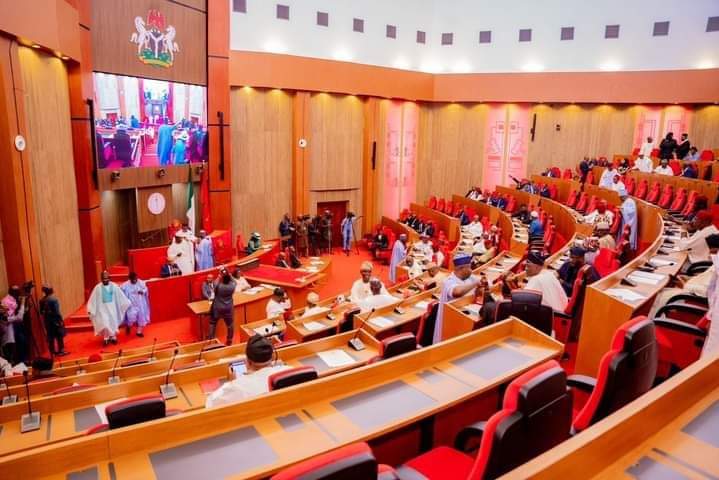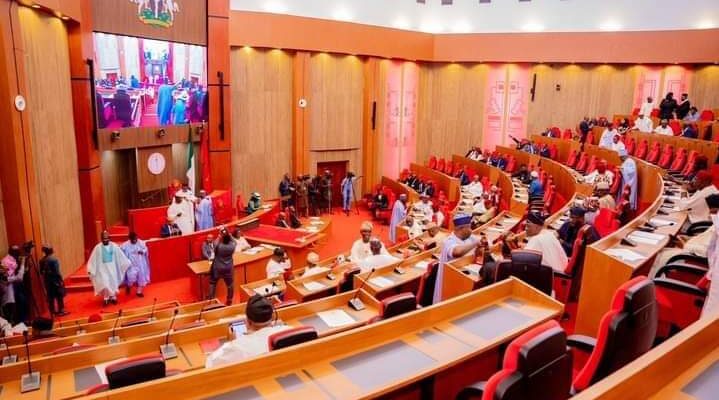
The Senate Committee on Ethics, Code of Conduct, and Public Petitions has dismissed a petition filed on behalf of suspended Senator Natasha Akpoti-Uduaghan, citing an ongoing legal case. The decision sparked intense disagreement, culminating in a heated exchange between Senator Onyekachi Nwebonyi (APC – Ebonyi South) and former Minister of Education, Dr. Oby Ezekwesili, who accompanied the petitioner, Zubairu Yakubu, to the hearing.
The petition, submitted by Yakubu, a constituent of Akpoti-Uduaghan, sought Senate intervention over allegations of misconduct. However, the committee ruled that the matter was already before a court of law and, as per Senate rules, could not be deliberated upon. The case in question was filed by Dr. Unoma Akpabio, the wife of Senate President Godswill Akpabio, against Akpoti-Uduaghan.
Citing Senate procedures, committee member Senator Adams Oshiomhole emphasized that it was standard practice for the legislature to refrain from discussing any issue actively undergoing judicial review. “The Senate cannot act on a petition when there is a pending case in court. It is a long-standing rule to ensure that we do not interfere with judicial processes,” Oshiomhole stated.
However, the decision was met with strong opposition from Dr. Ezekwesili, who accused the committee of using technicalities to dismiss critical allegations. She argued that the Senate had placed its internal rules above constitutional provisions and had denied the petitioner a fair hearing.
“The Nigerian Senate keeps telling citizens they are subject to Senate rules, even when those rules violate the Constitution. This is unacceptable in a democracy,” she said.
Tensions escalated when committee members insisted that Ezekwesili and other attendees take an oath before speaking. When she and her colleagues refused, Senator Nwebonyi launched into a verbal attack, calling her an “insult to womanhood” and a “hooligan.”
“You are an insult to womanhood, hooligan. People like you are not supposed to be here,” Nwebonyi said angrily. His outburst drew sharp criticism from Ezekwesili, who later told journalists that such behavior reflected a deeper issue within the legislative process.
Meanwhile, petitioner Zubairu Yakubu expressed frustration over the decision, stating that the committee’s refusal to allow Senator Akpoti-Uduaghan to testify had significantly weakened the case. Yakubu had requested that the suspended senator present crucial documentary evidence in person, but she was not granted access to the National Assembly due to her six-month suspension.
“In my petition, I clearly stated that my witness would present her evidence personally. But she was not allowed into the premises. If my key witness is denied access, how can I proceed with my case?” Yakubu questioned.
His legal counsel, Dr. Abiola Akinyode, further criticized the handling of the matter, pointing out inconsistencies in the Senate’s approach.
“There is nothing in Yakubu’s petition that was not in Senator Akpoti-Uduaghan’s original petition. If the Senate dismissed her petition as ‘dead on arrival,’ then logically, Yakubu’s should also be dismissed. Instead, they invited him for a hearing, only to dismiss it on procedural grounds,” Akinyode argued.
She also faulted the suspension of Akpoti-Uduaghan, describing it as a move that lacked due process.
“The Senate seems to be operating under its own rules, separate from the Constitution. That is why they can suspend a senator for six months without following due process,” Akinyode stated.
Ezekwesili and the legal team called for an independent review of the case, arguing that the Senate had demonstrated clear bias against the petitioner. They also questioned remarks made by the Chairman of the Committee, Senator Neda Imasuen, who had previously described Akpoti-Uduaghan’s petition as “dead on arrival” even before the hearing.
“How can the chairman serve as a judge in a case where he has already publicly taken a position? What is the need for us to present our case when a verdict has already been given before hearing us?” Yakubu asked.
The controversy surrounding the committee’s decision has raised concerns about fairness and transparency in legislative proceedings. With accusations of procedural bias and political interference, stakeholders are now calling for greater accountability in how the Senate handles petitions, particularly those involving its own members.

Comments